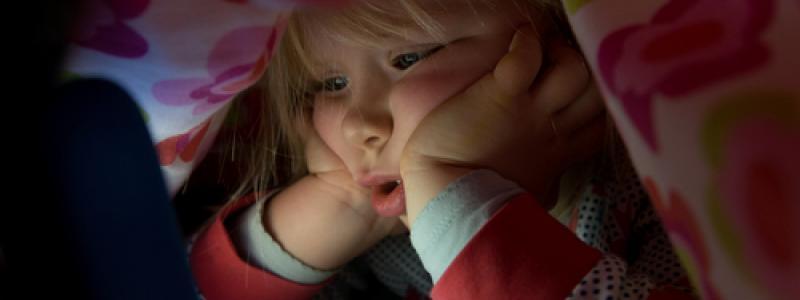Study: Too Much Touchscreen Time May Mean Lesser Sleep For Very Young Kids

It is fair to say that the kids born during the last few years may likely the first ever generation that will grow up surrounded by mobile devices with touchscreens. Apparently, scientists have already started studying how today’s smartphones and tablet devices can have an impact on very young children. And so far, the resulting findings are far from being encouraging.
As indicated in a new study recently published this week in the scientific journal Nature, it appears that too much time spent on touchscreen devices can result to some loss of sleep for infants and toddlers. Scientists have found before that time spent on traditional screens (such as television sets and video games) has been previously linked to sleep issues and poorer development results in kids. But now that touchscreen mobile devices are getting more and more easily available, children are being exposed more to screen time, and the bad news is that those getting affected are the younger ones. Among kids, sleep is essential because the more adequate the sleeping hours, the more likely that a kid will achieve cognitive development in his or her infancy or toddler years.
This recent study was conducted by a research team from the Centre for Brain and Cognitive Development at the University of London. To gather the pertinent information, the researchers polled more than 700 kids living in the United Kingdom with ages between 6 to 36 months. The findings were a bit surprising to say the least -- there was a significant link between how much time kids spent engaged in touchscreen devices, and the amount of sleep they were getting (decreased total hours of sleep, with decreased night time sleep, and increase day time sleep), as well as longer sleep onset (i.e. the time it takes to begin sleeping). The results show that for each extra hour of tablet use, kids got 15.6 minutes less total sleeping time.
Not many realize this, but all across the globe, people in general are getting less and less hours of sleep. Intriguingly, in the various studies being conducted regarding sleeping patterns, it is becoming clearer and clearer that increased engagement with our mobile devices has something to do with it. As indicated in a recent study released by the Centers for Disease Control and Prevention, more than 1 in 3 US adults are not getting enough sleep. This should be cause for alarm because lack of sleep has been found to increase the risks of developing weight problems, diabetes, high blood pressure, heart disease, and even stroke.
Related Articles:
Related Blog Articles
- Google’s Family Link Is Now On iOS
- Introducing Collections: Allowing Instagram Users To Organize Bookmarks Into Private Groupings
- US Mobile Has Expanded Its Prepaid Plans, With New Prices
- Here Comes Cabana: A New App From Tumblr
- iPhones Beginning To Get Some Love From Professional Photographers
- Google Play Music To Become Default Music Player On New Samsung Galaxy Devices
- Study: Kids Also Worry That Their Parents Are Spending Too Much Time On The Internet
- Is Dish Going To Enter Into The Wireless Business Too?
- Samsung Develops An Emoji Chat App Designed To Aid Users With Language Disorders
- Google Trips Gets Its First Major Update Ever
Related Blog Posts
- Report: Drug users are using wearable devices during binges
- Spotify allows Android users to reorder playlists; Pandora lets users share tunes to Snapchat Stories
- WhatsApp combats fake news with a new forwarded label
- FCC: Today’s improving mobile networks can impact healthcare costs
- Did Apple Music already overtake Spotify in America?


 Menu
Menu